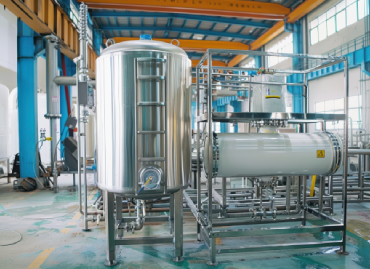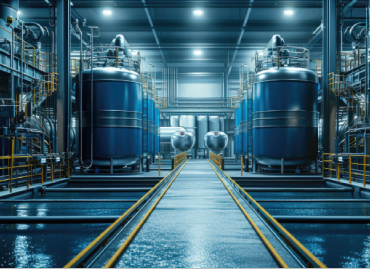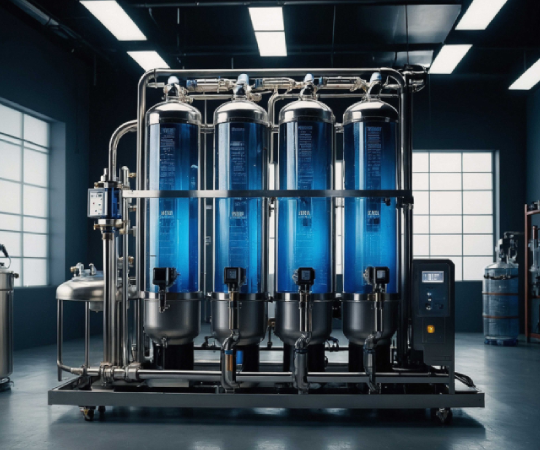- By Admin
- 16 Aug 2025
- ETP Plant
Comprehensive Water and Wastewater Treatment Strategies for Sustainable Food & Beverage Production
Water is an essential resource in the food and beverage (F&B) industry. It plays a crucial role in product formulation (such as beverages, dairy, and soups) and in many processing operations, including cleaning raw materials, machinery, and production lines. It also serves in auxiliary functions like cooling, steam generation, and sterilisation. In regions like Maharashtra, where the F&B sector is expanding rapidly, water usage efficiency is a growing concern. High-quality water ensures product safety and consistency, which is critical for maintaining taste, hygiene, and overall quality.
The demand for water in the F&B industry puts significant pressure on water supply systems. As urbanisation accelerates and the sector continues to grow, managing water resources effectively has become a key challenge. Businesses need to prioritise sustainability, minimising water wastage while ensuring compliance with environmental regulations regarding water consumption and discharge.
"In the food and beverage industry, water is both a critical ingredient and a process backbone. Efficient water use and advanced wastewater treatment are essential not just for sustainability, but for ensuring quality, hygiene, and regulatory compliance in every batch of product that reaches the consumer."
Water: The Silent Driver of Manufacturing
Along with water consumption, the F&B industry faces the challenge of wastewater generation. Wastewater is produced during numerous stages of production, such as processing, washing, sterilising, and packaging. The wastewater is often contaminated with food particles, organic matter, oils, fats, chemicals, and microbial contaminants. For instance, the dairy industry generates wastewater high in fats and whey, while beverage plants produce sugary wastewater. Similarly, meat processing plants discharge effluent containing proteins, blood, and fats.
The use of Cleaning-in-Place (CIP) systems further complicates wastewater management. These systems introduce detergents, disinfectants, and cleaning chemicals into the wastewater, making it even more challenging to treat. As a result, wastewater from the F&B industry often contains high Biochemical Oxygen Demand (BOD), Chemical Oxygen Demand (COD), and other pollutants like oils, greases, and microbial contaminants, which must be carefully treated to meet environmental standards.


Wastewater Treatment Processes
To manage wastewater effectively, industries implement multi-stage treatment systems. The first stage typically involves primary treatments like bar screening and oil traps to remove large solids and fats. In the secondary stage, anaerobic digestion is often used to treat high organic loads, followed by aerobic treatments such as the Activated Sludge Process (ASP) or Sequencing Batch Reactors (SBR) to break down organic contaminants using oxygen.
After biological treatment, the water undergoes final polishing through processes like sand filtration, carbon filtration, and disinfection (via UV or chlorine). These steps ensure that the water meets discharge standards or is safe for reuse in non-potable applications, such as cooling and flushing toilets within the plant.
Advanced Technologies for Wastewater Treatment
As the need for sustainability increases, the F&B industry is adopting advanced treatment technologies. Membrane Bioreactor (MBR) systems, for instance, combine biological treatment with filtration, resulting in compact and high-efficiency systems. These are particularly useful in situations where space is limited or when high-efficiency treatment is required.
Reverse Osmosis (RO) systems are increasingly used to purify water to a level of purity that makes it suitable for reuse in various industrial applications. This helps businesses reduce water consumption and achieve their sustainability targets. Moreover, automation systems using Internet of Things (IoT) technology and SCADA-based control panels are improving the monitoring and optimisation of water treatment processes, making them more efficient and cost-effective.
Tailored Solutions for the F&B Industry
Every sub-sector in the F&B industry generates wastewater with unique characteristics, making customised treatment solutions essential. Whether it's dairy, bakery, or beverage production, each type of effluent requires specific treatment methods. Providing services like site evaluation, system design, process integration, and maintenance ensures that businesses can manage their water resources efficiently while adhering to regulatory requirements.
Incorporating advanced technologies and automated systems allows companies to minimise wastewater discharge, reduce water consumption, and improve water quality for reuse. This not only helps industries achieve regulatory compliance but also supports their long-term sustainability goals and operational efficiency.
Summary And Conclusion
Sustainable water and wastewater management is crucial for the growth and environmental responsibility of the food and beverage industry. Implementing advanced technologies such as Membrane Bioreactors (MBR), Reverse Osmosis (RO), and automated monitoring systems helps optimise water usage, reduce wastewater generation, and ensure regulatory compliance. Tailored solutions are essential for meeting the specific needs of different F&B sectors. These technologies enable companies to achieve sustainability goals, reduce operational costs, and maintain high standards of product quality and hygiene. As the F&B industry continues to grow, efficient water management will be key to long-term success and environmental stewardship.































































